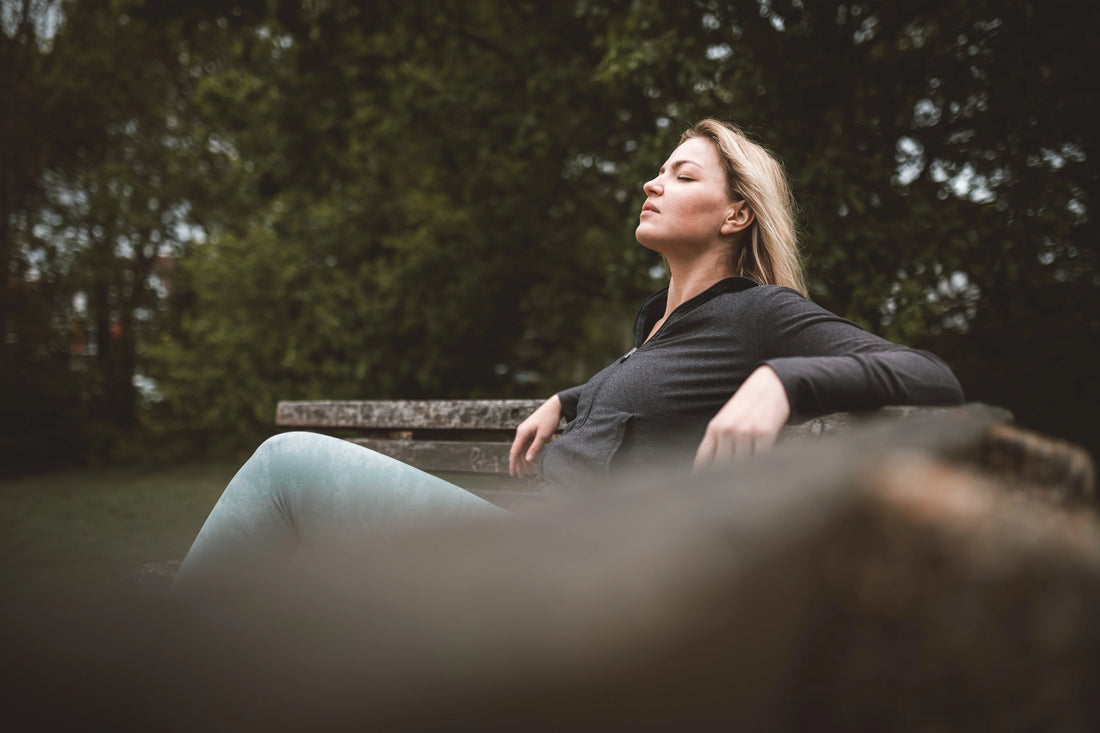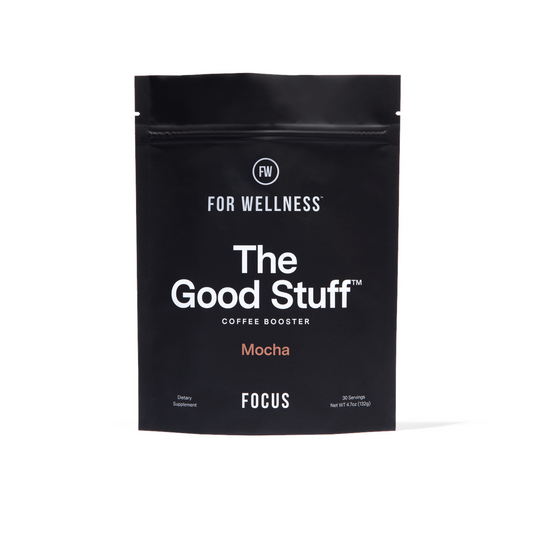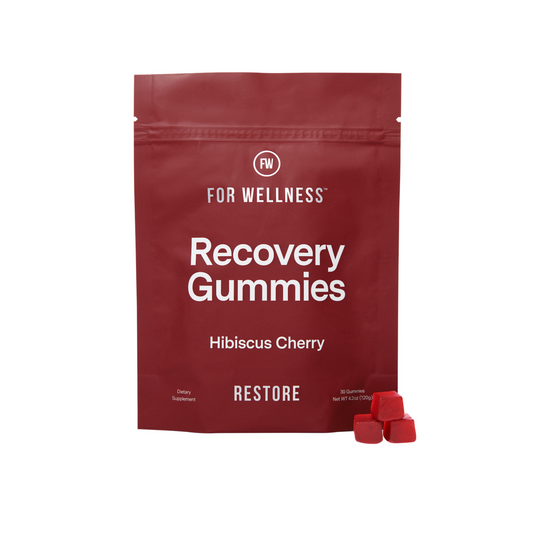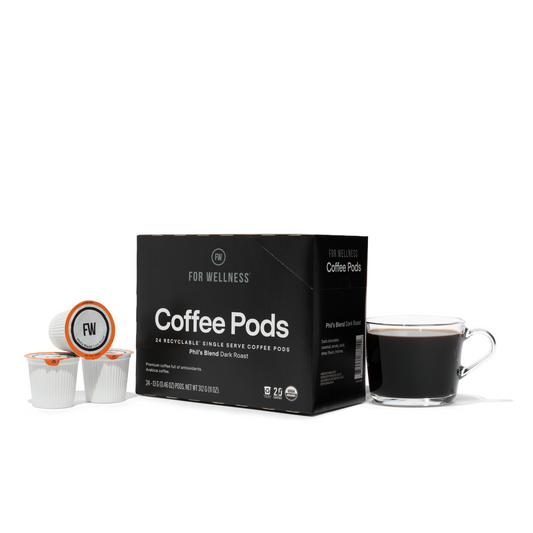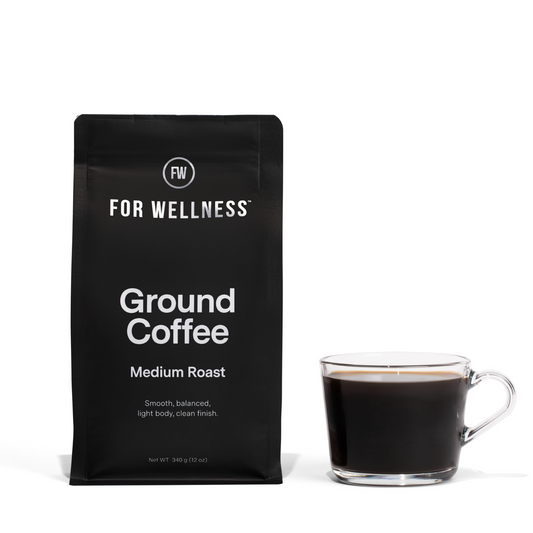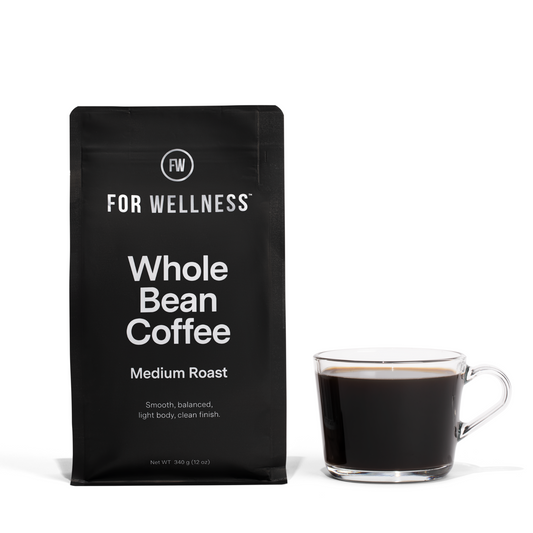Need that caffeine fix in the morning? Well, you're not alone. A whopping 80% of Americans consume caffeine daily, often in the form of coffee.
There are many reasons to love caffeine, especially in the morning. After all, this caffeine gives us added energy and focus when we need it the most. However, there are some unwanted side effects you may deal with regularly.
For example, many who drink coffee regularly experience caffeine jitters. When these jitters happen, you may think there is nothing to do except ride the painful wave out.
That stops today! We've got all the info you need on the jitters, how they work, and how you can prevent them. Keep reading to learn how you can make unwanted coffee jitters a thing of the past!


The Good Stuff - Performance
-
One scoop will infuse your coffee with healthy ingredients
-
Ditch the bad stuff like sugar, dairy, and artificial creamers
-
Fights inflammation and supports skin and joint health
-
Makes your coffee taste great
What Are Caffeine Jitters?
The term "caffeine jitters" refers to feelings of nervousness and anxiety after consuming coffee. The more coffee somebody drinks, the likelier they experience these jitters.
These jitters would be annoying enough on their own. However, another common feature of the jitters is a crash in the same added energy that coffee provides.
The result is effectively the worst of both worlds. If you drink coffee to get the energy to focus on a task, that crash means you lose both energy and motivation. But by learning more about the jitters and how they work, you may be able to avoid this unwanted condition.
What Causes These Jitters?
Caffeine jitters are directly caused by caffeine, hence the name. While it is most common to experience jitters while drinking coffee, any form of caffeine consumption can result in jitters.
On a more scientific level, caffeine jitters occur due to how your body processes caffeine. In nature, plants produce caffeine as a chemical reaction to help ward off competing plants. But it has an entirely different effect on the human body.
When you consume caffeine, it helps your body block out adenosine, a chemical that causes drowsiness. Your body stops receiving signals that you are tired. This is why coffee is so helpful when you are trying to wake up or get the energy you need for a particular task or project.
However, the caffeine effects don't stop there. Caffeine increases your blood pressure because it shoots adrenaline throughout your body. This is because our hearts have to work harder to pump blood throughout the body.
This alone can cause you to feel anxious and jittery. On top of that, consuming caffeine can make you experience symptoms of stress (more on this later).
What Other Side Effects Does Caffeine Cause?
In smaller doses, caffeine primarily makes you feel more energized and alert. In larger doses, it can cause a variety of annoying side effects.
For example, some experience insomnia when they drink too much caffeine. It's an annoying irony: you might drink caffeine to stay awake, but if you're not careful, caffeine will keep you from getting any rest.
Some who drink too much caffeine regularly experience an irregular heartbeat. This has to do with how caffeine consumption affects your heart and blood flow.
By itself, caffeine doesn't cause many digestive problems. In fact, a great benefit of caffeine is that it helps you to stay regular.
Caffeine can also cause annoying headaches. Of course, if you're a regular coffee drinker who goes too long without a cup, your head may hurt as part of the caffeine withdrawal symptoms.
These withdrawal symptoms may include more jitters, headaches, anxiety, tiredness, and more. Such symptoms are much worse if you quit coffee "cold turkey." But with our guide, you can learn more about how to get rid of caffeine jitters without quitting coffee.
The Relationship Between Caffeine and Stress
Have you ever had someone say to you that coffee makes them feel stressed out? Or have you ever experienced personal anxiety when reaching for that next cup? This is all due to how our bodies react to caffeine.
Specifically, caffeine often mimics stress symptoms. For example, we associate things like sweaty jitters with nervousness and stress, but caffeine can cause the same reaction. The fact that caffeine floods us with adrenaline and increases our blood pressure certainly doesn't help!
The good news is that if you experience these feelings while drinking coffee, you aren't actually stressed out...it's just a side effect of the coffee. The bad news is that if you're not careful, your favorite beverage can be a source of stress and anxiety.
Fortunately, most who experience such symptoms have consumed too much caffeine in one sitting. How much, though, is too much? Let's find out!
How Much Is Too Much Caffeine?
For most people, it is safe to consume up to 400 milligrams of caffeine per day. If you consume more than this, you are likelier to experience feelings of coffee jitters and coffee anxiety.
At first glance, that may seem like a lot of caffeine per day, but it all depends on how you consume it. For example, someone would have to drink ten sodas to get that much caffeine, but they would get the same amount from only four cups of coffee. And someone might consume that much caffeine by drinking only two "energy shot" style drinks!
All of this adds up over time. For example, you are unlikely to drink more than four cups of coffee in a single sitting. But you could easily have two cups in the morning and a cup at lunch. Throw in some sodas and energy drinks, and you'll have more than 400 mg of caffeine before you know it!
It's important to keep in mind, though, that this could vary from person to person. Some people may experience coffee jitters on less than 400 mg of caffeine, and some may have no jitters after, say, 500 mg of caffeine. But if you want to avoid getting jitters altogether, it's important to abide by these recommendations.
How Long Do Jitters Last?
Caffeine jitters usually last for a few hours. Unfortunately, different factors ranging from the coffee to your biology may affect how long everything lasts.
For example, you may get jitters within the first hour of drinking coffee if you are very susceptible to them. But if you have a stronger tolerance, the jitters may only hit you once more caffeine is inside your body.
Once the jitters hit, how long they last mostly depends on your body. For example, your body contains a particular enzyme known as CYP1A2 that helps your body metabolize caffeine.
Long story short? How soon your jitters take effect mostly depends on how much caffeine you consume. And how quickly you recover from these jitters depends on how fast your body produces the CYP1A2 needed to help you deal with the caffeine.
Ways to Get Rid of Coffee Jitters
No matter how well you can control your body, you can't simply will it to produce more CYP1A2 on demand. But that doesn't mean there are no concrete steps you can take to help stop caffeine jitters.
Below, we have a breakdown of different techniques that may work as well as why they are so effective. As with the coffee jitters themselves, these solutions vary from person to person. We recommend you experiment with different techniques to see which works best for you.
After that, we've got some solid info on ways to prevent future outbreaks of the jitters. Ultimately, an ounce of prevention is still worth a pound of cure...or, in this case, a pound of coffee beans!
Eat a Meal
Most coffee drinkers drink coffee in the morning. Depending on your schedule, you may be drinking coffee before eating breakfast. This may have the effect of making your jitters worse!
When you drink coffee on an empty stomach, it leads your stomach to produce more stomach acid. This may lead to everything from jitters to abdominal pain. And coffee on an empty stomach can even make you feel more anxious than usual.
However, if you eat a meal before you brew a cup or while you're drinking, you can avoid some of that abdominal pain because your stomach acid has actual food to break down. And while food can't entirely hold off the jitters, it can provide you with the energy you need to mitigate the effects.
Get Enough Water
Ever notice that you need to urinate more when you drink coffee? That's because coffee is a diuretic. And when you drink it on a regular basis, you may start to feel dehydrated.
In turn, this feeling of dehydration can make your coffee jitters even worse. Without enough hydration, you are going to feel more anxious. You may even feel weak and low on energy.
However, you can avoid most of these effects through proper hydration. If you drink a glass of water before your cup of coffee, you may be able to avoid the jitter altogether. Or, if you are already experiencing coffee jitters, drinking some water to rehydrate can help you to get them under control.
Using the Right Supplements
Do you ever add anything to your coffee before drinking it? Many people make certain additions so that their coffee tastes less bitter. And certain additives work very well in helping you stop caffeine jitters.
For example, l-theanine is an ideal coffee additive. L-theanine is a naturally occurring amino acid that may diminish feelings of stress.
Some products, like The Good Stuff, contain l-theanine and other naturally occurring supplements to make your coffee taste better and reduce caffeine jitters.
Drink Less Coffee
Earlier, we discussed how too much caffeine leads to jitters. If this is the case, the single most effective way to get rid of caffeine jitters is to drink less coffee.
For example, let's say you always have three cups of coffee in the morning. Cutting that back to two or even one cup can reduce your daily caffeine intake. And if you're experiencing jitters while drinking coffee, putting down the cup may help make the jitters dissipate.
Lowering your coffee intake from time to time is also a good way to discover your own body's particular limits. Everybody has different limitations, and finding out what your limits are can help you avoid getting the jitters in the future.
Exercise
When you have the jitters, it can feel a lot like nervous energy coursing through your body. Therefore, some people have discovered that the best way to reduce the feeling of jitters is to get some exercise.
The exercise in question can be almost anything. For example, you may want to jog or run around the neighborhood. But even going for a leisurely walk may get the job done.
If you find this technique works for you, then you might want to start going out for exercise each morning. In addition to helping you keep the jitters under control, a morning exercise routine can also help you lose weight.
Now that you know a bit more about how to reduce jitters in the moment, we're going to shift gears to prevention. Let's take a closer look at ways to prevent future jitter outbreaks altogether.
Ways to Prevent Future Jitters
Our different tips above are very effective at helping you reduce the jitters' effects. However, those tips might be considered a "last resort." That's because it's better to avoid getting the jitters in the first place.
How can you prevent future jitters? There are many techniques ranging from how you prepare your coffee to your drinking and sleeping patterns.
As with our tips for reducing jitters, you may find some of these techniques more effective than others. And it will likely take trial and error before you discover which methods work best for you.
Ditch the Sugar
For the most part, jitters are caused by caffeine. However, if you put a large amount of sugar in your coffee each morning, your jitters may be more due to the sugar content.
The average sugar rush follows the general caffeine pattern of providing lots of energy before you crash out. Depending on how you prepare your coffee, you may experience caffeine and sugar crashes!
If you think your jitters may be caused by sugar, consider cutting back on how much sugar you use or even going sugar-free altogether. This can help you prevent future jitters and make your coffee healthier by the sip.
Try Decaf
One of the simplest ways to avoid caffeine jitters is to avoid caffeine. Beyond drinking less coffee, you can do this by switching to decaf.
If you need that morning caffeine fix, this may not be your solution. But this is a great way to enjoy the coffee flavor you love without getting too much caffeine. Many drink decaf coffee at night to savor the flavor without ruining their sleep.
As with sugar, you don't have to switch to only drinking decaf coffee. But you may find that brewing more decaf occasionally helps keep you from getting unwanted jitters.
Plan Coffee Around Mealtimes
Earlier, we discussed how somebody experiencing the jitters on an empty stomach. This can help reduce that negative feeling after it starts. But if you want to avoid the jitters altogether, you need to change up when you drink your coffee.
Specifically, you need to plan your coffee around mealtimes. Instead of guzzling coffee first thing in the morning, try drinking it while eating bacon and eggs. This should prevent any of those empty-stomach jitters from happening in the first place.
Plus, breakfast is the most important meal of the day because it provides much-needed early morning energy. This can help you hit the ground running even as it prevents you from getting the jitters.
Embrace the Power of L-Theanine
Before, we noted how l-theanine is a coffee supplement that can make those jitters a thing of the past.
How does this work? In short, l-theanine smooths out the caffeine jitters and reduces stress by boosting calming brain chemicals. This alone may be enough to keep you from getting the jitters ever again.
And if you are trying to cut sugar out of your coffee, The Good Stuff is a delicious and healthier replacement. In addition to helping you avoid the jitters, The Good Stuff also helps to reduce the bitter taste of your coffee.
Get More Sleep At Night
Why do you think many people drink a lot of coffee in the morning? Most of the time, this is to help them wake up. Therefore, one of the simplest ways to prevent jitters is by getting more sleep and reducing how much coffee you need in the morning.
It may take a bit of experimentation to figure out how much sleep your body needs. In general, though, getting more sleep each night will reduce how much caffeine you consume in the morning.
Getting more sleep every evening also provides a full range of other health benefits. That makes this one lifestyle change that may truly change your life.
Drink Better Coffee
Sometimes, the jitters are inevitable due to the coffee you drink. Simply put, low-quality coffee leads to more jitters because people feel like they need to add more ingredients to improve the taste.
For example, remember when we said that too much sugar could lead to the jitters? Coffee drinkers often add a bit too much sugar to mask the taste of a bitter brew. Therefore, the solution is simple: you need to consume better coffee, and you need to do so before it goes bad.
As a general rule, you should brew coffee no more than a week after roasting the beans. The beans themselves should be very high-quality. One major sign of this is that you can enjoy the taste of the coffee even without adding any ingredients.
Combining higher-quality coffee with our tips and tricks above allows you to make unwanted caffeine jitters a thing of the past finally.
Get the Best-Quality Coffee Today!
Now you know more about caffeine jitters and how to prevent them. But do you know who can help you in the fight against jitters?
Here at For Wellness, we specialize in health and coffee. And it's our mission to help caffeine lovers like you brew coffee that is both tastier and healthier than anything you've experienced.
Our antioxidant coffee provides a healthy dose of antioxidants to your morning brew. Meanwhile, our Good Stuff coffee performance supplement contains l-theanine - the amino acid significantly reducing caffeine jitters.

